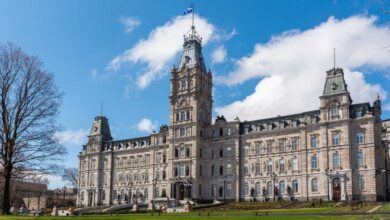Pathway to Canada Immigration Eased for Hong Kongers

Canada has removed the education requirements from the work experience stream the road to immigration for people from Hong Kong.
“In recognizing the extraordinary skills and potential of Hong Kong’s talented individualsCanada has taken an important step towards promoting inclusiveness and embracing the spirit of opportunity,” said Immigration Minister Sean Fraser.
“The lifting of the training requirement under Stream B [from August 15] is a win-win: it means we can welcome more Hong Kongers to Canada who need our support, while at the same time helping Canadian companies fill job gaps with employees who already have work experience here.”
In the wake of the crackdown on pro-democracy protesters in Hong Kong by the Chinese government, Canada created two new pathways to permanent residency on June 1, 2021.
Those two pathways include a stream A, for graduates in Canada, and a stream B for individuals with Canadian work experience.
Read more Canada immigration news
Canada’s Hong Kong Open Work Program extended for two years
Hong Kongers take out Canadian open work permits and permanent residence visas
Record numbers of Hongkongers emigrating to Canada
“Our government recognizes that real talent and valuable expertise are not just defined by formal teaching credentials,” said Paul Chiang, the parliamentary secretary to Canada’s housing and diversity and inclusion minister.
“By removing the education requirement under the Work Experience Stream B for the permanent residency pathway in Hong Kong, we are ensuring that qualifications are not a barrier to those who have valuable experience and expertise. This change sends a powerful message of welcome and encouragement, reinforcing our commitment to building a diverse and prosperous country.”
Ottawa’s latest move to help Hong Kongers succeeds with its Indo-Pacific Strategy, a plan to deepen Canadian involvement in the Indo-Pacific over the next decade.
The latest move also comes on the heels of other measures Ottawa has taken to encourage immigration from Hong Kong.
Two years ago, Immigration, Refugees and Citizenship Canada (IRCC) launched a new one in early February open work permit to enable eligible Hong Kong residents to gain valuable work experience in Canada and to apply for permanent residency more quickly.
This year, that measure was extended and expanded, allowing Hong Kong residents to register until February 7, 2025.
Watch video
“Canada needs more people for economic reasons … and for demographic reasons,” Fraser said. “The reality is that we cannot meet the needs of the market with the current workforce.”
To gain permanent residency, applicants must plan to live in a Canadian province or territory other than Quebec. Hong Kong residents living in Quebec are advised to consult the Ministère de l’Immigration, de la Francisation et de l’Intégration (MIFI) for more information on immigration pathways available to them in that province.
As of April 30, 2023, Canada had welcomed 3,122 permanent residents under the permanent residency pathways for Hong Kong residents, including 2,358 under Stream A and 764 through Stream B.
In Greater Vancouver’s community of Richmond, known for its high concentration of immigrants from Hong Kong, Richmond Center Member of Parliament Wilson Miao called the relaxation of Stream B path requirements a way to grow Canada’s social diversity .
“This will stimulate economic growth and promote cultural diversity,” said Miao. “Together, Hong Kong and Canada fuel our economy, create new opportunities and hope for stronger ties.”
With the extension of the open work permit program earlier this year, the immigration minister said Canada was both showing its support for the people of Hong Kong and helping itself to a skilled workforce.
Open work permits were created two years ago to help Hong Kongers come to Canada
“By extending and expanding Canada’s open work permits for Hong Kongers, we give Canadian employers more skilled workers to hire at a time when we need them most and provide valuable work experience, while at the same time demonstrating our support for the people of Hong Kong,” Fraser said.
That policy allows spouses or cohabiting partners and dependent children to also apply study permit or work permit.
Dr. Anna Victoria Wong, executive director of Community Family Services of Ontario, called the extension of the program a win for Canadian employers looking for skilled workers.
“As a social service provider, we understand the needs of incoming and growing populations very well,” said Wong. “As a publicly funded provider, we are aware of the challenges in our local economic and employment sectors.
“We aim to take advantage of the efficient use of resources to align the needs of both sides to create a win-win situation for new entrants and for Canada. This policy update serves just that, importing talents who are ready, willing and able to contribute to the Canadian economy and support the core values within our charter.”
Candidates wishing to apply for the In-Canada Graduates stream, Stream A must:
- hold a valid passport issued by the Hong Kong Special Administrative Region of the People’s Republic of China or the United Kingdom to a British Overseas National as a person born, naturalized or registered in Hong Kong;
- be physically present in Canada when they apply and receive permanent residency;
- have valid temporary resident status in Canada;
- intend to live in Canada, in a province or territory other than the province of Quebec;
- have graduated from a post-secondary educational institution in Canada in the three years prior to their application with either a diploma (non-graduate or postgraduate) for a program of at least two years, a diploma (associate, bachelor’s, master’s or doctoral), or a graduate degree or postgraduate diploma or certificate for a program of at least one year and at least 50 percent of the program completed in Canada (either in-person or online).
Those who hold a graduate or postgraduate diploma or certificate must also have completed a postsecondary diploma or diploma within five years prior to the start of their graduate or postgraduate program as a prerequisite for this graduate or postgraduate program.




